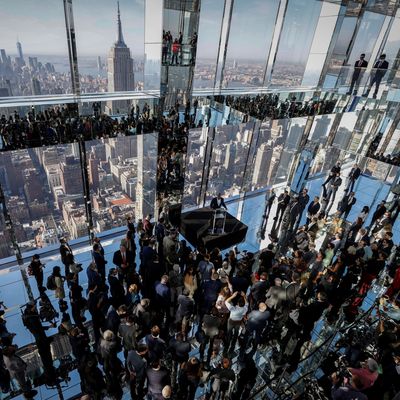
After the NYPD arrested journalists covering 2020 protests over George Floyd’s murder, the City Council passed a law stripping the police of the power to issue press credentials. Instead, the law put the mayor’s office in charge of giving out the passes that let reporters into official events and behind police lines.
Previously, the NYPD had not asked journalists about their criminal records in order to obtain credentials. But City Hall went further, quietly adding a rule requiring that journalists applying for credentials also disclose if they have records. The change caught reformers off guard and led them to call for dialing back the rule akin to a background check.
When the City Council passed Local Law 46 last spring, it moved credentialing authority to the Mayor’s Office of Media and Entertainment. Months later, at the end of the de Blasio administration, MOME fashioned the new rule, which went into effect this January under the Adams administration. The rule specifically asks applicants whether they have a felony conviction or “open case for a lawful arrest for a misdemeanor while newsgathering,” regardless of conviction.
“The standard should be the lawful conviction, or plea of the misdemeanor or felony, that’s related to the journalist’s job, activity or purpose,” said Norman Siegel, a longtime civil rights attorney and former executive director of the New York Civil Liberties Union.
MOME would also consider whether issuing a credential to someone with a record would “involve an unreasonable risk to property or to the safety or welfare of specific individuals or the general public,” which drew criticism for being too vague.
“What do those words mean?” asked Ron Kuby, the renowned criminal defense lawyer. “What’s an ‘unreasonable risk’ as opposed to a reasonable risk? We all pose some risk.” He added that “the notion that anybody with any prior felony at any time is halfway toward being denied a press pass is regressive and fundamentally inconsistent with any type of rehabilitative process.”
Keith Powers, the council member who sponsored the law, said he was caught by surprise by how MOME interpreted its new authority. “I was not aware of this rule in the application process, and think it should be removed to uphold the intention of Local Law 46,” he said in a statement.
The mayor’s office says it stands by the new policy. “The safety and wellbeing of New Yorkers are our top priority,” a City Hall spokesperson said via email, calling the rules “additional safeguards.” (The NYPD always had the discretion to suspend credentials if a journalist was arrested on the job.) City Hall emphasized that the rules were established before Adams took office. Finally, they said, MOME can’t block credentials without a hearing before an administrative court where journalists may challenge the move.
JB Nicholas, a formerly incarcerated journalist who previously sued the NYPD over the credentialing process, called what MOME is doing a “dirty trick.”
“MOME has zero legal authority to require background checks when the City Council bill does not authorize it—and, indeed, specifically removed it from its bill pursuant to the journalists’ community objections,” he said via email. “Looks like we’ll be going back to court.”






























